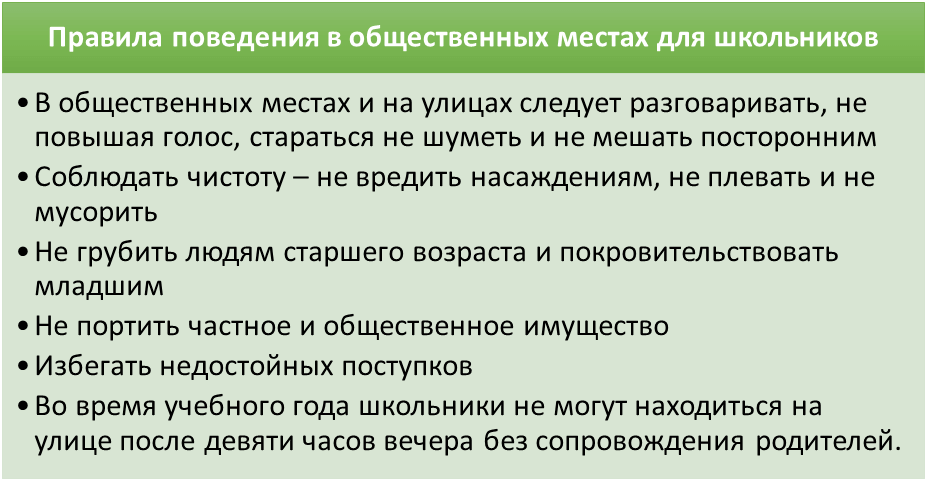Each of us has become an accidental witness of how parents feel embarrassed for their children on the street, in the subway, supermarket or even at the stadium. To avoid getting into such an unpleasant situation yourself, you should learn the rules of behavior for children in public places . This may seem like a simple task only at first glance, since the line between a well-mannered child and a child intimidated by his parents is quite blurred. At the same time, etiquette requirements for children of different ages also vary.
If we see a four-year-old child screaming at the top of his lungs in the park, in principle, there is nothing wrong with this and with the right approach, he can be weaned from it. If a boy is bawling, this is, at a minimum, alarming. What can we say about foul language, smoking and fighting. As a result, such behavior can lead to loneliness and problems with the law, because hooliganism is just a stone's throw away from crime.

Rules of conduct for preschoolers
Important
Education should begin from the first years of a child’s life, since this aspect of education is no less important than physical and intellectual development. The baby absorbs everything unusually quickly, so let it be good manners rather than bad habits.
As was said, certain concessions can be made for preschoolers. The main thing is to teach them the following basics:
- Do not play at the table during lunch;
- Do not offend children, girls and do not bully friends (it is important not to overdo it here, after all, the child must be able to stand up for himself);
- Do not beg strangers for sweets or toys;
- Do not go far from your parents;
- Listen to elders;
- Don't torture animals.
All these norms must be absorbed, as well as the duty of washing hands before eating and brushing teeth. Remember, it is easier to teach than to re-teach.
Basic rules of business etiquette
Essentially, this is a set of rules for communications in a work environment, mandatory for everyone, be it a big boss, a top manager or an ordinary employee:
- Don't be late.
- Always say hello, say “thank you” and “please”, and do not interrupt the other person.
- Warn about your visit.
- Before entering, knock or say “hello” if the door is open.
- In business negotiations, try to express yourself clearly, concisely and clearly so that the essence of your message is extremely clear.
- Refrain from excess slang and words of foreign origin, especially if the business meeting is attended by specialists from related fields who are not too familiar with the intricacies of your work.
- Double-check written messages and correct errors before sending.
- In instant messengers, do not split a long message into short ones - it is better to shorten the essence of the letter so that it easily fits into one message.
- It is better to answer a phone call after the 2nd or 3rd ring.
- If you are not answered after the 5th ring, hang up.
- If the connection is interrupted during a call, the call initiator must call back.
- Introduce yourself if you called from a new number.
- You should notify about your video call in advance, for example, by text message.
- During a video call, look at the other person, not at yourself in the camera.
- The handshake must be initiated by the manager, including if the subordinates are women.
- You are not supposed to kiss women's hands at business meetings.
- Do not reveal or ask for trade secrets.
- Do not discuss those who are absent, and especially do not speak badly about them.
- Always ask permission from your business partners if you want to refer to them to third parties, indicate them in the list of partners on your website, or tell any incident with their participation in the public sphere.
- For a business dinner, the person who invited you to dinner pays.
These are the basic rules of etiquette. We will not touch on all the rules of business communication - there are many of them, and they differ somewhat depending on the situation (communication with a client, boss or business partner). In principle, good manners and business etiquette are not so difficult.
Also, we will not dwell on the dress code rules - they may differ significantly for different areas. The clothing requirements for employees of a creative agency and a commercial bank are very different, and even within the industry it is worth clarifying the presence or absence of restrictions. In any case, clothes should be clean, look harmonious and match the accessories.
These are the basic rules of etiquette that must be followed. If your knowledge is much greater and wider, this is exclusively a plus for your karma. Moreover, you should learn special rules of behavior for those places that you visit often. For example, etiquette rules in a gym or fitness center. This will significantly facilitate your communication with others.
In addition, you can take our “Best Communication Techniques” program, and then you will be able to navigate absolutely any situation. We wish you interesting communication and effective communications and look forward to attending our programs!
We also recommend reading:
- Storytelling
- Attribution: Correspondence Inference
- Factors of social interaction
- How to Deal with Difficult People
- Male and female complexes
- What is social awkwardness and how to get rid of it
- Norms and rules of morality
- How to work productively in the heat?
- Conformism
- Golden rules of assertiveness
- “Why men want sex and women want love” - Allan Pease, Barbara Pease. Summary of the book
Keywords:1Communications, 1Relationships
Rules of behavior in public places for schoolchildren
There are generally accepted rules of behavior in public places that are simply obligatory. Their list can be found in any educational institutions, as well as places of recreation and leisure:
- In public places and on the streets you should speak without raising your voice, try not to make noise or disturb strangers.
- Maintain cleanliness - do not harm plants, do not spit or litter;
- Don't be rude to older people and patronize younger ones. Try to help people with disabilities.
- Do not damage private or public property.
- Avoid unworthy actions, including insulting passers-by, cruelty to animals, petty hooliganism, theft, etc.
- During the school year, schoolchildren cannot be outside after nine o'clock in the evening without being accompanied by their parents. During the holidays, the time spent outside is extended until 22:00 (not younger than 12 years of age).
- It is allowed to attend public events (concerts, sports games, festivals) no later than 21:30.
Rules of conduct in transport for school-age children
Also added to the rules is a list of prohibitions, the violation of which is unacceptable in modern society:
- It is prohibited to take part in or organize actions that violate public order;
- Resell and trade;
- Use foul language, smoke, drink alcohol, engage in gambling;
- Located on roofs, in basements and trains;
- Visit bodies of water unaccompanied by adults;
- Ride on the steps of trams and trolleybuses;
- Damage property, engage in sabotage.
Etiquette in public premises
The rules of good manners and etiquette in general premises are as follows:
- At the door, a man lets a woman go first, a junior lets a senior pass, and an ordinary employee lets a boss pass.
- Of those equal in age and status, the one closest to the door goes first. If the distance to the door is the same, the one entering lets the one leaving.
- You should hold the door if someone is following you.
- If the doors have double doors, follow the “right-hand traffic” rule and leave the left door for those coming towards you.
- The man goes down the stairs first, the woman goes up. If the stairs are dark or the room is unfamiliar to the woman, the man goes up the stairs first.
- The side of the stairs near the railing should be given to women, elderly people and children. Of two people of the same sex, the younger one is inferior.
- In the elevator, the person standing closest to the buttons must ask everyone else for the floor and press the necessary buttons.
- The person who enters the room is the first to greet those who are already inside.
- You should refrain from listening to music or watching movies without headphones.
- You should not look at someone point-blank, even if you are interested in something about the person.
- Women are allowed to keep their hat and gloves on indoors, but they must take off their cap and mittens.
- Don't initiate a handshake in the restroom.
And now it’s worth saying a few words about etiquette in transport.
How to teach culture of behavior in public places
?
Teaching a child a culture of behavior should not be ordered; a conversation with children is very important, during which they can learn the norms of being in society.
In addition to the official rules, there are informal aspects that schoolchildren should learn from their parents so as not to “goof off” when going out. You should educate your teen on how to present themselves in a movie or theater setting, and also tell them about the differences in etiquette in these establishments. They must not only know what NOT to do, but also know WHY it is prohibited. Sometimes a child simply doesn’t understand what’s wrong with rustling candy wrappers in the auditorium or why he can’t walk between the rows during a performance. Moreover, if you simply prohibit it without explaining the reason , the child will continue to strive to touch an exhibit in a museum or stick chewing gum under the table.
Don’t forget about the rules of behavior in public transport. They, like other requirements, include several points:
- Politeness. Explain to your child that you need to let older people and women pass in front of you, give way to them and not jostle inside the cabin.
- Payment for travel. To avoid unpleasant situations, you must pay your fare on time and not hide from the controllers.
- Maintaining cleanliness. You cannot throw garbage in the salon or paint the walls.
- Silence. The tram, of course, is not a library, but you shouldn’t make noise either, especially since it can distract the driver.
A few more norms of correct behavior in society:
- Cover your mouth when sneezing or coughing;
- Always be combed and not wear wrinkled clothes;
- Have a handkerchief handy;
- Eat with your mouth covered and use napkins;
- Avoid using harsh language towards anyone or anything.
Basic dating rules
By following these rules, you will not only be polite, but also make a good first impression on people:
- When meeting, a man is introduced to a woman, those younger in age or position are introduced to the elders, those who came later are introduced to those who came earlier.
- The person you are introducing the stranger to should be named first, and the person being introduced should be named second. For example: “Katya, meet me, this is Roman,” “Ivan Petrovich, this is Marina.”
- When meeting, it is acceptable and advisable to clarify the type of occupation and/or the degree of your acquaintance with those whom you introduce to each other. For example: “Katya, meet me, this is my husband Roman. Roma, meet me, this is my friend Katya, we studied at the university together.”
- The first person to shake hands should be the person to whom the stranger was introduced.
- If they want to shake your hand while you are sitting, you should stand up or at least stand up slightly.
And finally, another important topic is business etiquette.
Politeness is the key to success
Well, who likes rude people, except perhaps a very narrow circle of people who are trying to stand out with originality. A polite person, on the contrary, will be a welcome interlocutor in any company. That is why you should teach your baby politeness from the first days of life.
Important
Show everything by your example, if you say “thank you” and “please” to your child, such treatment will become normal for him, and he will reciprocate.
Try to turn the entire learning process from routine memorization of polite phrases (good morning, excuse me, thank you, etc.) into an exciting game. For every polite word - a reward, if you forget - a fine! Of course, it is worth rewarding and punishing not with rubles, but with action . For completing the quota of words, you can be allowed to take a longer walk or watch an “extra” cartoon. Charge a fine by squatting or cleaning. Just keep in mind that adults should also be fined. Create a list of polite words and place it on the refrigerator, and you will see how in a short period of time their use will become a habit.
Rules of behavior in a physical education lesson
Another “package” of norms of behavior:
- Always introduce yourself when calling someone;
- Be sure to knock on the door before opening it;
- Do not interrupt your interlocutor;
- Do not speak in front of strangers in an unknown language;
- Don't whisper;
- Do not turn your back to the interlocutor.
Table etiquette standards
This section of training can be the most difficult, since even many adults forget about the standards of decency at the table, let alone children who see adults as objects of imitation. It is important to learn the list of responsibilities and prohibitions at the table yourself and do not forget to repeat them to your baby.
Necessarily:
- Use cutlery correctly;
- Wash your hands before eating;
- Take just enough to satisfy your hunger;
- Use napkins without replacing them with trousers, curtains or hands;
- Give thanks for the dish and the company.
Do not do it:
- Eating with your mouth open, making unpleasant sounds;
- Play at the table;
- Talk with your mouth full;
- Criticize food;
- Don't care, pick your mouth and put parts of the dish on the table.

Learning by example
Simple conversations are often not enough; it is important to teach a child by example. If the father does not give up his seat on the subway to his grandmother or spits at his feet, then with a high probability the teenager will behave the same way and no amount of persuasion from the mother will work. In addition, schoolchildren are greatly influenced by their social circle. If it seems to you that the teenager is not in the best company, try to point this out to him as gently as possible. It is best to show with some living example how ugly certain actions look. Then you need to explain that such cases can have a negative impact on his future.
If a child understands from the cradle what is good and what is not so good, he will definitely listen to your words. Do not start education until a critical point, when it may be too late to make any changes. Show educational cartoons with an instructive plot more often and try to develop curiosity in your son or daughter. This way he won’t have time to be distracted by all sorts of unnecessary pranks. And remember, the first assistant to a teacher is patience!
Rules of conduct in cafes and restaurants
When you find yourself in a cafe or restaurant, try not to forget about the following:
- The man is responsible for the companion’s clothes - he helps to take off a fur coat or coat and puts the companion’s outerwear in the wardrobe.
- In the hall, a man helps his companion sit down by moving the chair, and only after that sits down himself.
- While eating or waiting for your order, you should not place your elbows on the table. As an exception, a lady can put her elbows on the table for a short time, but not a gentleman.
- You cannot place foreign objects on the table that are not related to the meal.
- If you need to show any item - a phone, a book, something else - just pass it from hand to hand.
- Applying cosmetics, combing your hair, and doing other things should be done exclusively in the restroom.
- Don't talk on the phone at the table.
- If you need to make or receive a call, apologize and leave the table.
- It is acceptable to cough or sneeze into the crook of your elbow.
- You should not take a transparent wine glass or glass with oily hands.
In fact, table etiquette is a much larger body of knowledge, and it may differ from country to country. It would be better if, before traveling abroad, you familiarize yourself with the rules of conduct in the country of your visit.
If the amount of information seems too large and difficult to remember, you can use mnemonic rules or associative memorization techniques. For example, it is known that bread should be on the left, drinks on the right. Fold your fingers into the Ok gesture, and the combination on your left hand will resemble the letter b (bread), and on the right - d (drink).







